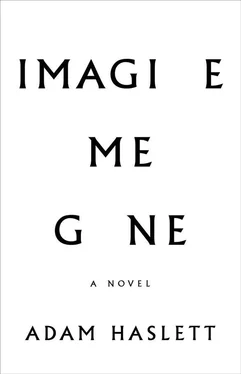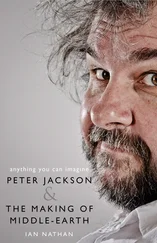When the rain lets up to a shower, I turn on the engine and back the car onto the road. By the time we get home, the sky is nearly clear. The early-evening sun is bathing the side of the house, where the storm has soaked the shingles.
Margaret has made the four of us a cold supper. We sit at the dining room table with all the downstairs windows open. There’s a reason I try to be away from here as often as I can. The worst of the fog may have lifted, letting me see again, but it’s in the most familiar objects that the beast still nestles, exuding itself from the caned rocking chair in the corner, the one that Margaret and I bought together in Southampton, and from the fluted-glass lamps on the sideboard that her parents gave us as a wedding gift. It pulses in the watercolor of the old octagonal house that hangs above the sideboard, over Margaret’s shoulder, as she passes Celia the bulgur salad and Alec the plate of bread, and it slinks onto the table between us, its head invisible as always but its body breathing, everyone straining to behave as if there were only four us here, eating supper together on a summer evening.
“Aren’t you going to take some food?” Margaret asks, unable to hide her impatience, holding her knife and fork rigidly against the table, waiting to start, which is when I notice that all the dishes are at my end and my plate is empty. A few months ago, I overheard her describing to a friend on the phone the exhaustion of trying to get me out of bed in the morning, how her energy for the day was spent before breakfast.
“I asked for the raise,” Alec says, interjecting himself to protect me from his mother’s ire. “The manager said she’d think about it.”
I take some salad and bread so they can begin their meal. A moment later, the phone rings. Celia starts up from the table before the first bell has ended and strides into the hall to answer it.
“It’s Michael,” she calls out. “He wants you to call him back on their number.”
“It’s quite late for him,” Margaret says, standing up from the table. She carries the phone into the living room and closes the door behind her as Celia takes her seat again. The two of them miss their older brother — they laugh less without him — but they would never say it because they know he wasn’t happy here, and that he wanted so badly to go back.
They eat quickly and then excuse themselves, bringing their plates into the kitchen. Margaret is still on the phone. I stay at the table for a while, feeling the cooler air drifting in through the screens. Above the hydrant at the foot of the drive, the street lamp flickers on, casting a pale oval of light onto the pavement. Crickets sing in the bushes. Through the wall behind me, I hear Alec leaping up the stairs, then Celia following more slowly, muttering something about him staying out of her room. These sounds don’t grate anymore. They flow back into me now, ordinary once again.
There’s a click of the latch to the living room door, and Margaret calls out my name. “Here,” she says, handing me the phone. “He’s got his literature A level tomorrow, and he can’t sleep. God knows what this call is costing.” She walks away, back to her meal, and I close the door between us.
“Dad?” he says, and I know from the strain in his voice that the words have already been streaming out of him to his mother. It’s been a relief having him gone. Margaret never let up about what I wasn’t doing, how I didn’t make time for him, or speak to him like I should to an eldest son. But it was never what she thought — some hesitancy or lack of nerve on my part about his reaching puberty and adolescence. I wouldn’t have talked to him about that in any case because he wouldn’t have wanted it any more than I did from my father. Our silence wasn’t about that.
“Yes?” I say.
“I can hang up now, if that’s better, I know it’s expensive.”
“You spoke to your mother about your exam.”
“Yeah.”
“No use fretting about it.” I want to say more, to say, You’ll be fine, in the long run, you’ll be fine, but I don’t believe it, not as I do about the other two.
“I know, I know, you’re right, it’s just that I couldn’t read everything in time, not closely enough.”
This is the thing: He isn’t calling about his exam. I don’t want to know this, but I do. He’s calling to be reassured about something he can’t put into words yet. I glimpsed it in him when he was young, but told myself, No, don’t imagine that. Children have stages; he’ll change. Then the words started running out of him in a torrent, and I knew they were being chased out by a force he couldn’t see. What was I supposed to say to Margaret? That I see it in him?
“I’m sure you’ve studied more than I did,” I tell him. It is dark outside now. The light from the kitchen lies square on the unmown grass.
I will leave him more alone than anyone.
“If we don’t get into a university,” he’s saying, hurrying to fill the silence and prolong the conversation, “Simon and I decided we’re going to move to London together. He’s got friends who already have a flat, and he thinks it would be easy for us to get jobs.”
My son in London as a young man. It’s hard for me to picture.
“You should talk to your mother about that.”
“You wouldn’t mind — if I didn’t get in anywhere?”
I tell him that he will. “It’s late,” I say. “You should get some rest.” He agrees, reluctantly, wanting to stay on the phone. “How are Celia and Alec?” he asks. “Are they okay?”
I’m reminded I haven’t answered only when he says, “Dad? Are you there?”
“Yes, I’m here.”
He senses the trouble. He knows it is there. If I could only take that part of him with me, to spare him. But I can’t. And so, unlike the others, it’s as if he is following me, and won’t let me go.
“It really is late with you,” I say. “You’ll be fine — with the exam. You’re a good writer.”
“You think so?”
“Yes.”
“Okay, then,” he says. “I guess I’ll go.”
“Good-bye, Michael. Good luck.”
“Okay, Dad,” he says. “Bye.”
Later, lying next to Margaret as she sleeps, I sense a tingling in my feet and ankles and up into my calves. It is the opposite of numbness. My muscles are awake, my blood moves freely. This halo of warmth creeps over my knees, easing space into the joints, letting the bones of my thighs settle into the mattress. It lingers over my belly, and my gut goes slack, unclenching the muscles at the base of my spine. My lower ribs rise with my breath up off my stomach, stretching the skin from navel to sternum, arching my back. It feels as if my lungs have doubled in size, allowing me to swallow air in great gulp-fulls. My shoulders fall back, my throat opens, the tingling warms my jaw and scalp and then moves through into the folds of my brain, releasing it away from my forehead, letting it rest against the back of my skull. Thus it is that the beast passes out of me, to hover in the darkness above, faceless still, but quarry now, its hours numbered.
I get up before dawn, rousing no one but Kelsey, who lifts her head from her blanket in anticipation of her walk, and then scampers toward where the leash hangs by the back door. I pat her on the head, and leave her there, getting what I need from the tool drawer, and going out the other way, through the front door, closing it quietly behind me. Outside, in the charcoal light, it is blessedly cool, as if the fever of summer has broken. It’s still too dark to make out the far side of the sloping meadow at the end of the street. The dew-covered grass blends into the trees silhouetted against the barely brightening sky.
It is the fallow field next to my parents’ cottage, where I played in the tall grass; and the field behind the octagonal house, where I cut paths for the children to ride on; and the hillside in Scotland where I walked with Margaret; and the woodland meadow on the island in Maine. All of these are given back to me now, the landscapes of my happiness, returning in this damp calm, limpid and flooded with life.
Читать дальше












